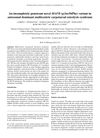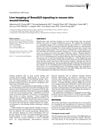 33 citations,
January 2009 in “Contraception”
33 citations,
January 2009 in “Contraception” Chlormadinone acetate is a strong, well-tolerated hormone used in birth control and hormone therapy with benefits for menstrual pain and skin conditions.
 32 citations,
February 2024 in “Growth Hormone & IGF Research”
32 citations,
February 2024 in “Growth Hormone & IGF Research” Dihydrotestosterone (DHT) stops hair growth in mice by lowering a growth factor important for hair.
 30 citations,
January 2009 in “Nuclear Receptor Signaling”
30 citations,
January 2009 in “Nuclear Receptor Signaling” Hairless protein is crucial for healthy skin and hair, and its malfunction can cause hair loss.
 29 citations,
September 2012 in “Birth Defects Research”
29 citations,
September 2012 in “Birth Defects Research” Wounds heal without scarring in early development but later result in scars, and studying Wnt signaling could help control scarring.
 26 citations,
May 2019 in “PLOS ONE”
26 citations,
May 2019 in “PLOS ONE” Hair loss patients have different microbes in hair follicles, possibly affecting hair loss.
 24 citations,
October 2017 in “Scientific reports”
24 citations,
October 2017 in “Scientific reports” Changing light exposure can affect hair growth timing in goats, possibly due to a key gene, CSDC2.
 22 citations,
June 2013 in “Australasian Journal of Dermatology”
22 citations,
June 2013 in “Australasian Journal of Dermatology” Early stage bald spots are linked to skin inflammation and damage to the upper part of the hair follicle.
 22 citations,
June 2013 in “International journal of molecular sciences”
22 citations,
June 2013 in “International journal of molecular sciences” Stem cell differentiation is crucial for skin barrier maintenance and its disruption can lead to skin diseases.
 21 citations,
February 2012 in “Journal of the European Academy of Dermatology and Venereology”
21 citations,
February 2012 in “Journal of the European Academy of Dermatology and Venereology” Late-onset alopecia areata in Taiwanese patients is more common in women, usually starts at age 57, often involves less than 10% hair loss, and may have a minimal link to thyroid issues.
 20 citations,
May 2013 in “International Journal of Molecular Medicine”
20 citations,
May 2013 in “International Journal of Molecular Medicine” Researchers found a new gene variant linked to a rare bone disease, which doesn't always cause symptoms in carriers.
 18 citations,
November 2020 in “Frontiers in Cell and Developmental Biology”
18 citations,
November 2020 in “Frontiers in Cell and Developmental Biology” Inflammation plays a key role in activating skin stem cells for hair growth and wound healing, but more research is needed to understand how it directs cell behavior.
 18 citations,
December 2018 in “Expert Opinion on Biological Therapy”
18 citations,
December 2018 in “Expert Opinion on Biological Therapy” Hair follicle stem cells are promising for wound healing but require more research for safe clinical use.
 16 citations,
September 2018 in “Journal of Ethnopharmacology”
16 citations,
September 2018 in “Journal of Ethnopharmacology” Plant-based remedies may treat hair loss by reducing inflammation and improving insulin resistance.
 16 citations,
December 2016 in “Molecular Medicine Reports”
16 citations,
December 2016 in “Molecular Medicine Reports” Platelet-rich plasma may help hair follicle cells grow by affecting certain genes and pathways.
 16 citations,
June 2008 in “Springer eBooks”
16 citations,
June 2008 in “Springer eBooks” Over 50% of women over 50 experience hair loss, with minoxidil being the only proven effective treatment.
 16 citations,
May 2000 in “Endocrinology”
16 citations,
May 2000 in “Endocrinology” A new gene, mrp4, is found in mice and may play a unique role in hair follicle development in tails and ears.
 15 citations,
April 2002 in “British Journal of Dermatology”
15 citations,
April 2002 in “British Journal of Dermatology” Hairless gene not strongly linked to baldness.
 14 citations,
February 2023 in “Frontiers in immunology”
14 citations,
February 2023 in “Frontiers in immunology” Immune checkpoint inhibitors can cause skin issues but are linked to better cancer outcomes.
 14 citations,
June 2019 in “Dermatologic therapy”
14 citations,
June 2019 in “Dermatologic therapy” PRP did not significantly regrow hair in alopecia areata totalis patients.
 14 citations,
May 2013 in “American Journal of Physiology-endocrinology and Metabolism”
14 citations,
May 2013 in “American Journal of Physiology-endocrinology and Metabolism” Removing myelin protein zero-like 3 in mice leads to better metabolism and resistance to obesity.
 13 citations,
January 2018 in “Cellular Physiology and Biochemistry”
13 citations,
January 2018 in “Cellular Physiology and Biochemistry” Fat-derived stem cells can help protect and repair skin stem cells from aging caused by UV light.
 12 citations,
September 2007 in “Wound repair and regeneration”
12 citations,
September 2007 in “Wound repair and regeneration” Smad2/3-dependent TGF-β signaling increases during wound healing.
 11 citations,
July 2021 in “Nanomaterials”
11 citations,
July 2021 in “Nanomaterials” Wound covers with α-13'-COOH from vitamin E can improve and speed up wound healing.
 11 citations,
February 2016 in “Current Medicinal Chemistry”
11 citations,
February 2016 in “Current Medicinal Chemistry” New treatments for prostate cancer and BPH show promise, including novel compounds that target hormone synthesis and response.
 11 citations,
December 2014 in “The American journal of pathology”
11 citations,
December 2014 in “The American journal of pathology” A gene deletion in mice causes weak protein, immune issues, hair loss, airway problems, and wasting disease.
 10 citations,
May 2018 in “Neuropharmacology”
10 citations,
May 2018 in “Neuropharmacology” Drugs for hormone-related conditions might help treat mental disorders but could have serious side effects.
 10 citations,
February 2010 in “Acta Histochemica Et Cytochemica”
10 citations,
February 2010 in “Acta Histochemica Et Cytochemica” c-kit affects hair growth and color in alopecia areata and androgenetic alopecia.
 9 citations,
August 2021 in “Biological Chemistry”
9 citations,
August 2021 in “Biological Chemistry” ECM-inspired wound dressings can help heal chronic wounds by controlling macrophage activity.
 7 citations,
July 2020 in “Pigment cell & melanoma research”
7 citations,
July 2020 in “Pigment cell & melanoma research” RT1640 treatment reverses gray hair and promotes hair growth in mice.
 7 citations,
September 2017 in “Scientific Reports”
7 citations,
September 2017 in “Scientific Reports” Mice with too much sPLA₂-IIA have hair loss and poor wound healing due to abnormal hair growth and stem cell depletion.





























